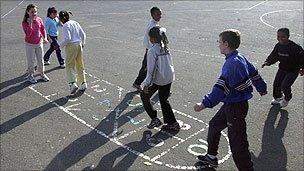Rich-poor pupil gap 'not closing'
- Published

The pupil premium will be the latest attempt to bridge the attainment gap between rich and poor
Schools are unlikely to be able to close the achievement gap between pupils from rich and poor backgrounds, say researchers.
There have been repeated attempts to reduce the impact of social inequality on academic achievement.
But this study from the University of Manchester says schools alone are not going to be able to bridge this divide.
It says that previous attempts to narrow the gap have not made "substantial sustained improvements".
The review, published by the British Educational Research Association, says schools can make a big difference to some individual pupils - and individual schools in disadvantaged areas can have high results.
But overall it suggests that schools have struggled to break the stubborn link between a poor background and low academic achievement.
Health and housing
"Neither general nor targeted interventions have, thus far, demonstrated substantial sustained improvements that can be spread more widely across the stock of schools," says the review, Social Inequality: Can Schools Narrow the Gap?
Mel West, co-editor of the review and head of Manchester University's school of education, says that schools in isolation are not going to be able to achieve a more equal outcome for pupils.
"It's possible for schools to play a role but there needs to be parallel strategies in health, housing and employment," says Professor West.
Otherwise, he says, the best efforts of schools are going to be insufficient to counter the other problems facing pupils and families in their home background.
He says that if pupils are in families that are struggling with unemployment, bad housing and poor health, the ability of schools to close the gap with more affluent children is going to be limited.
League tables
Prof West welcomes the latest plans for a pupil premium targeting funds at schools serving disadvantaged children.
But he cautions that the impact of previous attempts to spend more on schools in deprived areas has been less than expected - suggesting that schools cannot provide a "panacea" for politicians trying to address broader social ills.
And he says that in recent decades schools have faced an "unprecedented level" of new policies from a succession of ministers, often not long enough in office to see through their different priorities.
He also says that the increase in competition between schools, including the use of league tables, has not helped to narrow the gap between the educational experiences of rich and poor.
"Twenty years of competition between schools has done little to improve the lot of disadvantaged pupils," he says.
Schools can make an important difference to pupils, he argues, but they can also face unrealistic expectations of how much they can tackle wider social problems and inequalities.